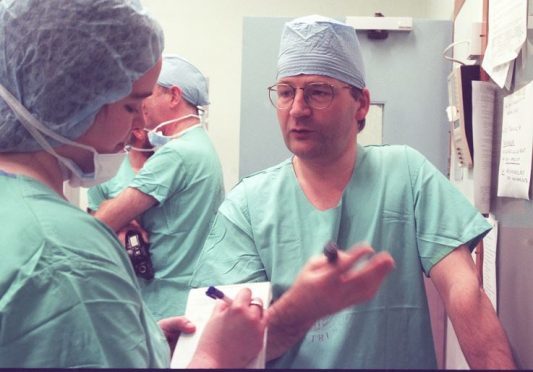The Queen’s surgeon in Scotland has quit his post at NHS Grampian – a year after being controversially suspended by the health board.
Professor Zygmunt Krukowksi was suspended from his job at Aberdeen Royal Infirmary in May following a probe into his conduct.
Last night, health chiefs confirmed the 67-year-old had left NHS Grampian.
His colleague Dr Wendy Craig, who had also been suspended, has also stepped down from her job at the health board.
Neither Prof Krukowski nor Dr Craig could be contacted for comment.
The Queen’s Surgeon in Scotland is responsible for the care of the monarch when she stays at Balmoral.
It was not clear last night whether Prof Krukowski will continue with his royal duties.
When his suspension was announced last year, his predecessor Colonel Michael Stewart publicly backed him and described him as “a most professional and remarkable surgeon”.
The resignations of Prof Krukowski and Dr Craig were confirmed just days after the conclusions of a report into the behaviour of senior staff at the north-east’s flagship hospital were made public.
The report, carried out by the Royal College of Surgeons in England (RCS), called for “major changes” to be made at ARI.
It found there was “real potential” for the working environment to “impact on patient care”.
The health board came under fire following its decision to suspend both surgeons, and refer them to the General Medical Council.
The board’s former medical director, Donnie Ross, was among those who accused health bosses of taking “revenge” on the pair after they raised concerns about the running of ARI.
In addition, a total of 21 medics – all with links to NHS Grampian – criticised the suspensions, and demanded that the truth about the move was made public.
In an open letter to Health Secretary Shona Robison, they suggested it was simply because they had spoken out against management and urged her to reinstate them.
The signatories demanded a judge-led inquiry into the management of the health board.
The RCS was commissioned to lead an investigation into a “dramatic breakdown” in team work at the hospital.
The inspectors were asked to examine the behaviour of surgeons, as well as outcomes of 16 operations – mainly on the gall bladder, liver and bile ducts – in September 2014.
Initially, health bosses refused to publish the report, despite a groundswell of opposition to their decision.
The Press and Journal made two attempts to view the report under freedom of information laws – only to be given a copy of the 69-page document with 49 pages blacked out line-by-line.
However, on Monday, the Press and Journal revealed the conclusions of the report after a Scottish Information Commissioner’s ruling paved the way for them to be made public.
It emerged that a number of unnecessary operations were carried out on patients.
The report stated that “with the benefit of hindsight, the surgical treatment of these patients may not have been in their best interests”.
It also raised concerns over communication between staff at the hospital.
